On November 23, the crew aboard the Worldwide Area Station (ISS) reported an uncommon scent whereas opening the hatch to the just lately docked Russian Progress MS-29 cargo spacecraft, resulting in the rapid implementation of decontamination procedures in response to a tweet posted by Worldwide Area Station on the platform X. The spacecraft, which had docked efficiently to the station’s Poisk module, was discovered to include an sudden odour and visual small droplets, prompting the crew to shut off the affected space as a security measure.
As reported by a number of sources, the supply of the odour, described by NASA astronaut Don Pettit as “harking back to spray paint,” raised preliminary issues concerning potential contamination inside the Russian section of the ISS.
Whereas Pettit’s description highlighted the depth of the scent, NASA and Roscosmos each activated air-purification methods to handle the potential danger. The American section deployed its Hint Contaminant Management Subassembly (TCCS), whereas further filtration methods have been engaged within the Russian module to revive air high quality. As an additional precaution, all crew members donned private protecting gear (PPE), the official deal with of ISS clarified in a submit.
Steady Monitoring Ensures Crew Security
With air sensors monitoring the setting constantly, flight controllers confirmed by November 24 that the station’s air high quality had returned to protected ranges. This replace allowed the crew to reopen the hatch between the Poisk and Progress modules with none danger. Although the particular supply of the odour stays underneath investigation, officers have indicated that there are not any present security issues for the crew, and the air high quality is again to regular ranges in response to a number of stories.
Routine Resupply Mission Unaffected
Progress MS-29, a part of an ordinary resupply mission, launched from Baikonur Cosmodrome on November 21, bringing important objects similar to meals and gasoline to the ISS. The spacecraft will stay docked for the following six months earlier than transporting waste supplies again to Earth. Regardless of the preliminary alert, ISS operations have been confirmed to proceed as deliberate, with security protocols guaranteeing no interruption to station actions.
Sources at NASA and Roscosmos have assured that efforts are underway to establish the origin of the odour and additional preventive measures might be carried out as required.

